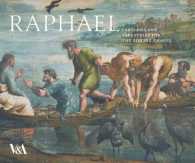- ホーム
- > 洋書
- > 英文書
- > Literary Criticism
Full Description
Essays on a variety of topics in late medieval literature, linked by an engagement with form.
The insight that "the implications of textuality as such" can and must underlie our interpretations of literary works remains one of A.C. Spearing's greatest contributions to medieval studies. It is a tribute to the breadth and significance of his scholarship that the twelve essays gathered in his honour move beyond his own methods and interests to engage variously with "textuality as such," presenting a substantial and expansive view of current thinking on form in late medieval literary studies. Covering a range of topics, including the meaning of words, "experientiality", poetic form and its cultural contexts, revisions, rereadings, subjectivity, formalism and historicism, failures of form, the dit, problems of editing lyrics, and collective subjectivity in lyric, they offer a spectrum of the best sort of work blossoming forth from close reading of the kind Spearing was such an early advocate for,continues to press, and which is now so central to medieval studies. Authors and works addressed include Chaucer (The Canterbury Tales, Troilus and Criseyde, The Legend of Good Women, "Adam Scriveyn", "To Rosemounde", "TheComplaint Unto Pity"), Langland (Piers Plowman), the Gawain-poet (Cleanness), Charles d'Orléans, Gower (Confessio Amantis), and anonymous lyrics.
Cristina Maria Cervone teaches English literature and medieval studies at the University of Memphis; D. Vance Smith is Professor of English at Princeton University.
Contributors: Derek Pearsall, Elizabeth Fowler, Claire M. Waters, Kevin Gustafson, Michael Calabrese, David Aers, Nicolette Zeeman, Jill Mann, D. Vance Smith, J.A. Burrow, Ardis Butterfield, Cristina Maria Cervone, Peter Baker.
Contents
A. C. Spearing's Work and Influence - Cristina Maria Cervone and D. Vance Smith
Bibliography of A. C. Spearing's Work - Peter S. Baker
The Wife of Bath's "Experience": Some Lexicographical Reflections - Derek Pearsall
The Proximity of the Virtual: A. C. Spearing's Experientiality [or, Roaming with Palamon and Arcite] - Elizabeth Fowler
Makyng and Middles in Chaucer's Poetry - Claire M. Waters
Fayre Formez: Vernacular Scriptural Paraphrase and Lay Reading in Cleanness - Kevin Gustafson
Langland's Last Words - Michael A Calabrese
Re-reading Troilus in Response to Tony Spearing - David Aers
The English Charles: Subjectivity, Texts and Culture - Nicolette Zeeman
The Inescapability of Form - Jill Mann
Destroyer of Forms: Chaucer's Philomela - D. Vance Smith
Gower's Confessio Amantis and Chaucer's Canterbury Tales as Dits - John A. Burrow
Poems without Form? Maiden in the mor lay Revisited - Ardis Butterfield
"I" and "We" in Chaucer's Complaint Unto Pity - Cristina Maria Cervone
Two Appreciations of A. C. Spearing - Peter S. Baker and Elizabeth Fowler
Announcing a Literary Find Apparently Related to the Gawain-poet - Cristina Maria Cervone
Works Cited








